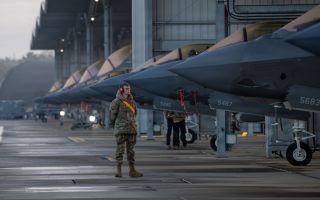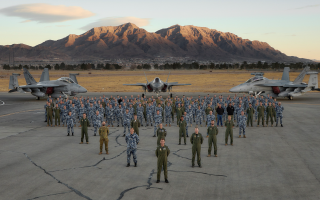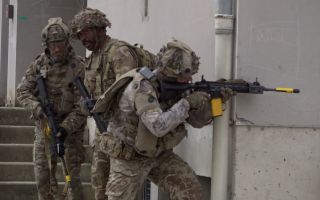
Tri-Service
Comment: Why The West Can't Win The War In Syria

Article by Christopher Lee, Defence Analyst
Why has the mighty USA not won the war in Syria? Missiles, drones, laser bombs, satellite intelligence, allies from all over the world and still the war goes on.
Refugees are being abandoned and Russia is calling the shots - literally. The 'President Assad Must Go' posters in the White House have long since faded.
With all the military might that could destroy the world in an afternoon the United States has failed to do what it thought so easy in 2011.
President Assad was expected to step down within a few weeks of the demonstrations that spread from Daraa where the first real signs of protest had emerged.
President Obama had made it clear from day one in the White House that he saw the Middle East as a military and political quagmire where only the legacy of failure would survive.
But Obama had to choose sides or risk even greater pressures from US allies like Saudi Arabia. Saudi Arabia, apart from its oil and dollar attractions, remains America's political and military landlord in the region.
On August 18 2011, President Obama said President Assad should step aside but it was not what the rebels nor America's allies wanted to hear. They wanted a 'get out of town' notice pinned on Assad's Presidential door. But Assad was never going to pack his bags, Assad was not Saddam Hussein, no Colonel Gaddafi.
The protest became an armed confrontation within months. Opposition groups took up weapons. They killed 120 Syria troops and desecrated their bodies. Anyone who wanted to join the fight was welcomed.
The result obvious: a desperate and disparate armed opposition to Assad demanding support - political, financial and military - from the major outside players such as the United States, the United Kingdom, the Saudis and the Turks.
Without understanding what they were doing, many of US allies supported the so-called Coalition against Assad. It was called a coalition, it was nothing of the sort. It was split armed opposition that soon included al-Qaeda and then Islamic State.
What went wrong from the start? The so-called Western alliance did not understand what was going on. The leaders, including Obama, were badly advised and no-one could stick firmly to their ambitions because they did not know what they were and how to get to them.
The scale of the conflict demanded on the ground military intervention. To have made that strategic jump would have meant unacceptable commitments from countries such as the US and UK, only just out of or still in Iraq and Afghanistan.
Furthermore, none of the apparently sophisticated military outside forces had any idea whatsoever how to fight Assad and gradually they did not trust the side upon which they would have to fight. The internal coalition of opposition increasingly seen as a group who, if in power, would run a bloodbath of revenge.
COMMENT: The Nukes With Turkey's Name On
Obama and Co kept out other than mounting distant warfare against Islamist groups and arranging arms to rebels. The insertion of Western special forces made little difference.
Then of course, the Russians arrived. They backed the Assad regime, removed without any discretion rebel positions and helped destroy much of Western Syria.
The Turkish war against Kurds was but a side-show but an example that Syria had become a battlefield of such consequence that apart from downtown Damascus -a futile but telling description - Syria no longer existed.
And what have we got from the desolation? Assad remains in power assisted by a powerful Russia. A proxy war is being fought between Iran and Saudi Arabia, and there's a refuge population that the world does its very best to forget - if ever it took notice.
There is one other aspect: the surviving rebel groups whose blatant ambitions neither suited American understanding of the conflict, nor made military sense, now hope with considerable fervour that Hillary Clinton makes it to the White House. To do what?
Whatever Hillary Clinton's mood there is no way she wants to get involved in a tough military commitment in the Middle East. Moreover, Congress will not let her... Hillary is fine with that.
Two people know that for sure: Presidents Putin and Assad. There is nothing that will garner domestic political support that American and her allies can do. Moreover, there is nothing at all in the latest military adviser's think tank that will change that.
The armed opposition groups of 2011 are now powerless figures at fringe meetings. Today's real opposition in Syria are the jihadist groups who have taken the rebellion much further. Their ambition is not simply to unseat Assad; it is to replace the government in Damascus with rule by Sharia Law - but the commitment of Russia may prevent that.
Barring a palace revolution, the outcome looks simple: Assad stays in a possibly split territory, with Russia in much the same position as the United States is in Saudi Arabia.
Curiously, Russia's position may therefore benefit America and her allies, even though they will not be able to publicly admit it.









